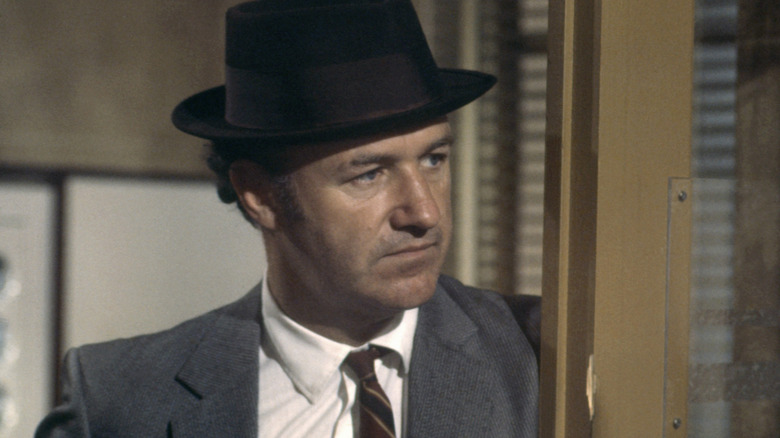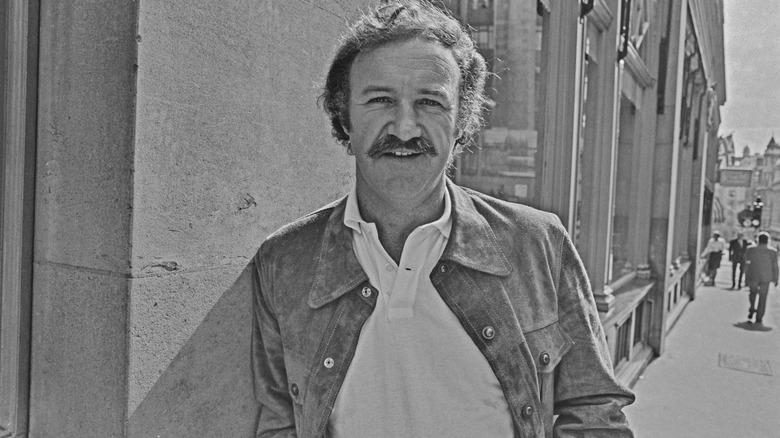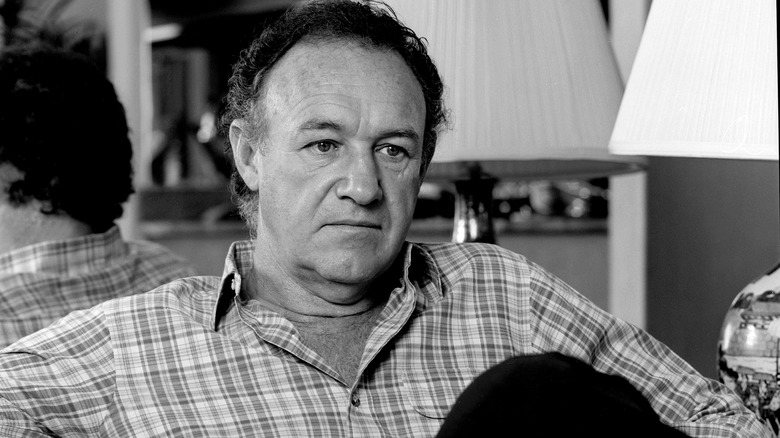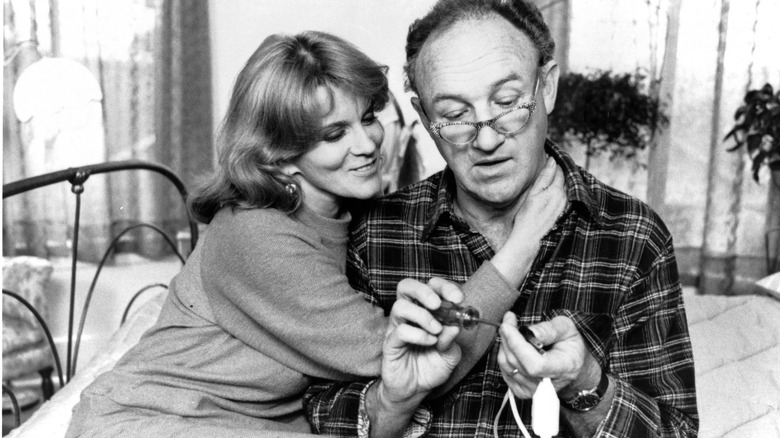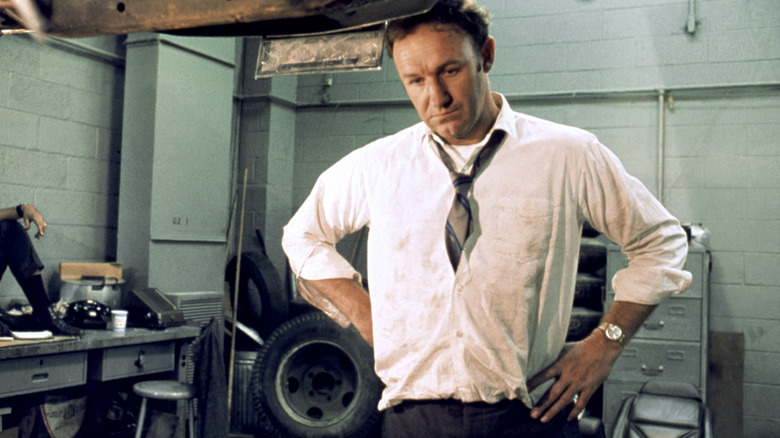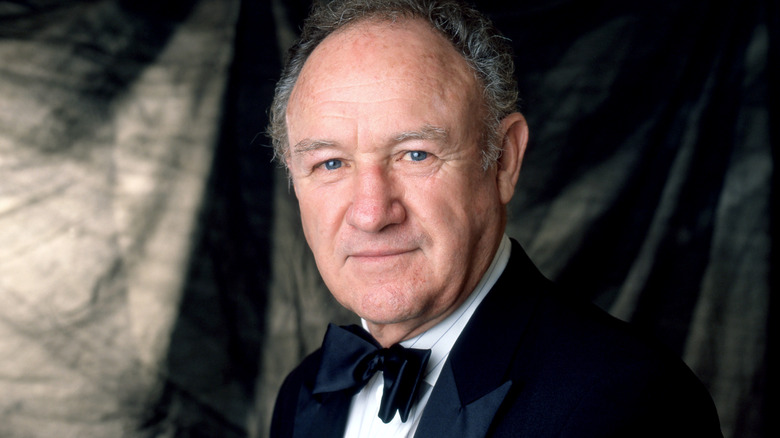Tragic Stories About Gene Hackman
When it comes time to sit down and have a serious talk about some of the greatest actors in modern cinema, Gene Hackman is on the list. It was, after all, long before the Marvel Cinematic Universe and the DC Extended Universe became a bajillion-dollar industry that Hackman and Christopher Reeve made comic book movies cool.
And that's the thing about Hackman: It doesn't matter if he's in a Superman movie, wearing spurs and a six-shooter, or taking on a drug ring in 1970s New York — he's got the gravitas to pull it off and make viewers forget they're even watching Gene Hackman. Plenty of actors are great at their craft, but viewers watching a Tom Cruise movie know they're watching a Tom Cruise movie. Hackman? He ceases to be Hackman, and that's a testament to sheer determination. He was, after all, voted the least likely to succeed in his class at the Pasadena Playhouse (alongside Dustin Hoffman).
Hackman is the sort of actor who's always let his work speak for itself, and off-camera, he's a notoriously difficult interview. That's not out of any deep-seated desire to be difficult, and he explained to the Los Angeles Times: "I don't like talking about myself. I just, I don't know — I guess I'm a private person. For me, acting is a kind of private thing, and I just don't like sharing it." That said, he has spoken about some of the most difficult times in his life, and it's heavy stuff.
His father abandoned his family in an incredibly cold way
In 1994, Gene Hackman spoke to the Los Angeles Times about some childhood trauma that he was still trying to deal with. At the time, he was 63 years old, and 62 movies into his incredibly successful acting career — one that took off in spite of his notorious temper and tendency to go toe-to-toe with directors if he was told something he didn't like. That, he's said, was a rebelliousness that was deeply rooted in an unhappy childhood, set in a Great Depression-era town, dominated by a father who hit him to discipline him, and a mother who struggled with alcoholism.
Hackman's solution was to retreat to the basement: "I would make up this little cardboard room that would be all contained and cozy," he recalled. Still, he tried to spend some quality time with his dad, and that was usually on Saturdays. Saturday was their day to hang out, until the Saturday that his father left 13-year-old Gene, his mother, and his 6-week-old brother. "That day, he drove by and waved at me, and I knew from that wave that he wasn't coming back," Hackman told The New York Times. "That wave, it was like he was saying, 'Okay, it's all yours. You're on your own, kiddo.'"
It would have been easier to get mad, but in a conversation with Larry King, Hackman shared how it impacted him: "I don't think I was ever bitter. I loved him. I loved him right to the end."
If you or someone you know may be the victim of child abuse, please contact the Childhelp National Child Abuse Hotline at 1-800-4-A-Child (1-800-422-4453) or contact their live chat services.
Gene Hackman lost his mother in a terrible accident
For Allan Hunter's biography, simply titled "Gene Hackman," Hackman reflected on his life growing up after his father left the family. While he acknowledged the fact that they never went hungry, it still wasn't easy — he, his brother, and their mother lived with his grandmother in Danville, Illinois. Filled with frustration, he said that he needed to get out so badly that he enlisted in the Marines when he was just 16.
In an interview with GQ, Hackman confirmed the story that he and his mother would often go to the movies together, and she'd said how neat it would be to see him on that big screen. "I would have been 10," he said. "Things parents say to children are oftentimes not heard, but in some cases you pick up on things that your parent would like to see you have done. Unfortunately, my mom never saw me act, so I'm sorry for that, but that's the way it is."
Hackman's breakout role — in "Bonnie and Clyde," which famously kicked off the New Hollywood Movement — came five years after his mother died in a tragic house fire. Details are scarce, and understandably, none come from Hackman himself. It seems, however, that she was killed after drinking too much and passing out while holding a lit cigarette; she died in the resulting fire. Hackman says that if he could have shown her any of his films, it would have been "I Never Sang for My Father."
Divorce, regret, and filming a movie that hit too close to home
When Gene Hackman's divorce from his first wife was finalized in 1986, they had been married for 30 years. Allan Hunter's biography, "Gene Hackman," talks about what else was going on in his life at the time of the divorce: He was filming "Twice in a Lifetime" (pictured), which was a movie about a man who gets bored with his home life, then upends it all in favor of his local bartender. "It was a little painful for me to play that role, and although I thought I could use some of what I was going through at the time, it didn't really work out that way," he said later.
When he spoke with The New York Times in 1989, Hackman acknowledged the impact his career had on his family. He recognized in hindsight that it hadn't been good for anyone: "You become very selfish as an actor. You spend so many years wanting desperately to be recognized as having the talent, and ... it's very tough to turn anything down. ... The temptations in that, the money and recognition, it was too much for the poor boy in me. I wasn't able to handle that."
He's been candid, too, about putting acting ahead of his children. When GQ asked him what advice he'd given his son, he replied honestly that he'd been gone so much that he didn't feel as though he could relate: "I lost touch with my son in terms of advice early on."
His good friend died by suicide
Gene Hackman is famously hard-working, but he's also hinted at the fact that his work ethic has helped him avoid confronting the things that are the most painful, like the 1982 death of his good friend Norman Garey. In an interview for American Film magazine shortly after Garey died by suicide, Hackman explained (via The Daily Beast), "It wouldn't be good for me to lie about for the next year or so. For a number of reasons, I'm going to have to work hard. It's something I know how to do, and it's something I can rely on."
Hackman has been typically close-lipped about the lasting impact that Garey's death has had on him, but a look at not only his friend's death but what happened afterward makes it clear that it was a complicated, heartbreaking situation. Garey was an entertainment lawyer, and after he died, The New York Times reported there were accusations that some clients of Garey's firm had been involved in a massive embezzlement scheme.
The rumors seemed so credible that the Los Angeles District Attorney's office put together a whole task force to investigate, and when they were done, they found there was absolutely no indication that anything shady had been going on under Garey's watch. Garey — who had established his own law firm, with Hackman among his first clients — was cleared. It was PR guru Michael Maslansky who explained the uproar best, saying, "Hollywood is a town that is dying for the next disgrace."
A narrowly avoided, potentially fatal heart attack and ill health forced an early retirement
Gene Hackman's last movie was 2004's poorly received "Welcome to Mooseport," and in 2009, he sat down for an interview with Empire. They wanted to know if the film's critical and commercial failure had anything to do with his retirement, but Hackman explained that there was a much sadder reason that he'd made the choice he'd felt little agency in: "The straw that broke the camel's back was actually a stress test that I took in New York. The doctor advised me that my heart wasn't in the kind of shape that I should be putting it under any stress."
For Hackman, that diagnosis would likely have brought back memories from around 15 years prior. In 1990, Hackman had just finished filming "Company Business" and was vacationing in Oregon when he went to the hospital with chest pains. Then, it was right into surgery to repair a dangerously narrowing artery. Although the Los Angeles Times quoted his cardiologist as saying that he was fine, there was a little more to it.
Doctors had told his wife that if he hadn't gotten treatment when he did, he would have died — and in fact, he'd dodged death by just a few hours. So he slowed down, albeit reluctantly. When Reuters asked him in 2008 if he missed the entertainment business, he simply said, "Yes, I do. I miss the actual acting part of it, as it's what I did for almost 60 years, and I really loved that."
